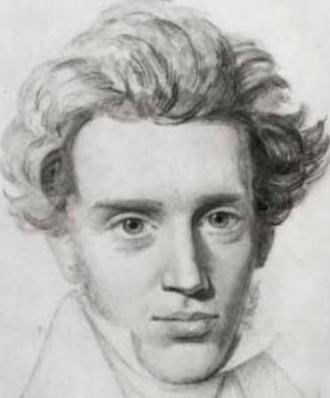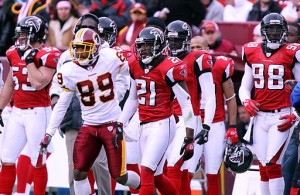 In our discussion of yesterday’s post The Problem with Crowds, Stefan Stackhouse linked to an essay by Søren Kierkegaard, The Crowd is Untruth. That essay is shockingly profound,, with great resonance for today.
In our discussion of yesterday’s post The Problem with Crowds, Stefan Stackhouse linked to an essay by Søren Kierkegaard, The Crowd is Untruth. That essay is shockingly profound,, with great resonance for today.
The Danish Lutheran/proto-existentialist takes a theological, as well as ethical, view of crowds. He points out that the Bible says, “Love thy neighbor”; not “love the crowd.” He deals with “the daily press” and its creation of an abstract “public” that assumes an authority over what we are supposed to consider true. He critiques those whose profession it is to lead a crowd and how they often ignore an individual in need because of their obsession with big numbers. He addresses preaching. (Yes, one can legitimately preach to a hundred thousand, as well as to ten. But don’t let the desire to attract a hundred thousand determine what you are going to preach.) He warns against the “numerical”–attending to numbers as your main criterion.
Pastors of big churches and of small churches should read this essay, excerpted after the jump. So should church growth consultants, who often give the direct contrary advice. (Large congregations don’t have to be “crowds” in this sense. And small congregations should be appreciated, though they too can turn into smaller “crowds.”)
You don’t have to agree with Kierkegaard on everything to appreciate the force of his argument here. But let me raise a question: How can we avoid the danger of the crowd being untruth while acknowledging the corporate nature of the Christian faith? Some Christians do have a completely individualistic understanding of Christianity–as in Tom T. Hall’s song “Me and Jesus”–with no need, as in that song, for the Church.
I suspect Kierkegaard’s answer would be in terms of how Christianity is for “the one,” yet “everyone can become that one.” And in what he says about the love of neighbor. Does this solve the dilemma, or is he taking individualism too far?
From Søren Kierkegaard, The Crowd is Untruth:
There is a view of life which holds that where the crowd is, the truth is also, that it is a need in truth itself, that it must have the crowd on its side.[Note 2] There is another view of life; which holds that wherever the crowd is, there is untruth, so that, for a moment to carry the matter out to its farthest conclusion, even if every individual possessed the truth in private, yet if they came together into a crowd (so that “the crowd” received any decisive, voting, noisy, audible importance), untruth would at once be let in.[Note 3]
For “the crowd” is untruth. Eternally, godly, christianly what Paul says is valid: “only one receives the prize,” [I Cor. 9:24] not by way of comparison, for in the comparison “the others” are still present. That is to say, everyone can be that one, with God’s help – but only one receives the prize. . . . God in heaven, who from this exalted state of bliss, without becoming the least bit dizzy, looks out over these innumerable millions and knows each single individual; he, the great examiner, he says: only one receives the prize; that is to say, everyone can receive it, and everyone ought to become this by oneself, but only one receives the prize. Where the crowd is, therefore, or where a decisive importance is attached to the fact that there is a crowd, there no one is working, living, and striving for the highest end, but only for this or that earthly end; since the eternal, the decisive, can only be worked for where there is one; and to become this by oneself, which all can do, is to will to allow God to help you – “the crowd” is untruth.
A crowd – not this or that, one now living or long dead, a crowd of the lowly or of nobles, of rich or poor, etc., but in its very concept [Note 4] – is untruth, since a crowd either renders the single individual wholly unrepentant and irresponsible, or weakens his responsibility by making it a fraction of his decision. . . .
The crowd is untruth. There is therefore no one who has more contempt for what it is to be a human being than those who make it their profession to lead the crowd. Let someone, some individual human being, certainly, approach such a person, what does he care about him; that is much too small a thing; he proudly sends him away; there must be at least a hundred. . . .
The crowd is untruth. . . .The daily press and anonymity make our age even more insane with help from “the public,” which is really an abstraction, which makes a claim to be the court of last resort in relation to “the truth”. . .
And to honor every individual human being, unconditionally every human being, that is the truth and fear of God and love of “the neighbor”; but ethico-religiously viewed, to recognize “the crowd” as the court of last resort in relation to “the truth,” that is to deny God and cannot possibly be to love “the neighbor.” . . . Never have I read in the Holy Scriptures this command: You shall love the crowd. . . . To love the neighbor is self-denial, that to love the crowd or to act as if one loved it, to make it the court of last resort for “the truth,” that is the way to truly gain power, the way to all sorts of temporal and worldly advantage – yet it is untruth; for the crowd is untruth. . . .
To become a crowd, to gather a crowd around oneself, is on the contrary to distinguish life from life. . . .; But it is the crowd which has power, influence, reputation, and domination – this is the distinction of life from life, which tyrannically overlooks the single individual as the weak and powerless one, in a temporal-worldly way overlooks the eternal truth: the single individual.
[Note 3] Perhaps, however, it is right to note, although it seems to me to be almost superfluous, that it naturally could not occur to me to object to something, for example that there is preaching, or that “the truth” is proclaimed, even though it was to an assembly of a hundred thousand. No, but even if it were an assembly of just ten – and if there should be balloting, that is, if the assembly were the court of last resort, if the crowd were the decisive factor, then there is untruth.
[Note 4] The reader will therefore recall, that here by “crowd,” “the crowd” is understood as a purely formal conceptual definition, not what one otherwise understands by “the crowd,” when it supposedly is also a qualification, when human selfishness irreligiously divides human beings into “the crowd” and the nobles, and so forth. God in heaven, how would the religious arrive at such in-human equality! No, “crowd” is the number, the numerical; a number of noblemen, millionaires, high dignitaries, etc. – as soon as the numerical is at work, the “crowd” is “the crowd.”
Portrait by Sperantarice (Own work) [CC BY-SA 3.0 (http://creativecommons.org/licenses/by-sa/3.0)], via Wikimedia Commons





